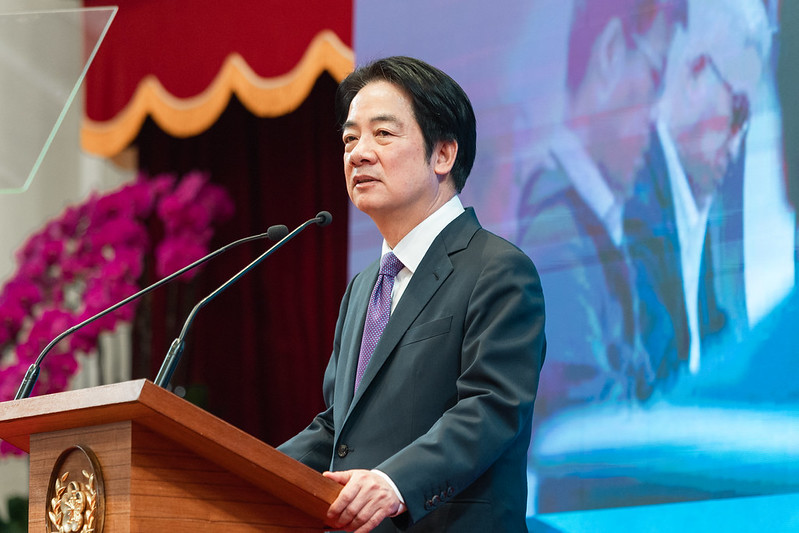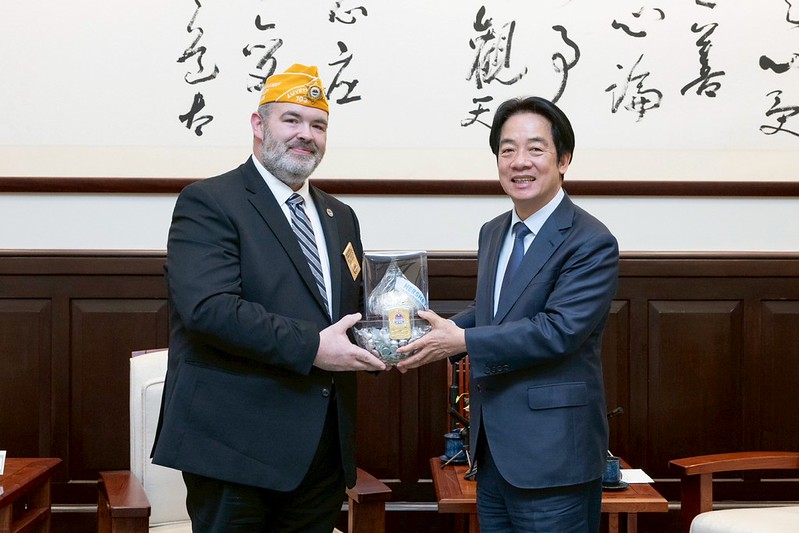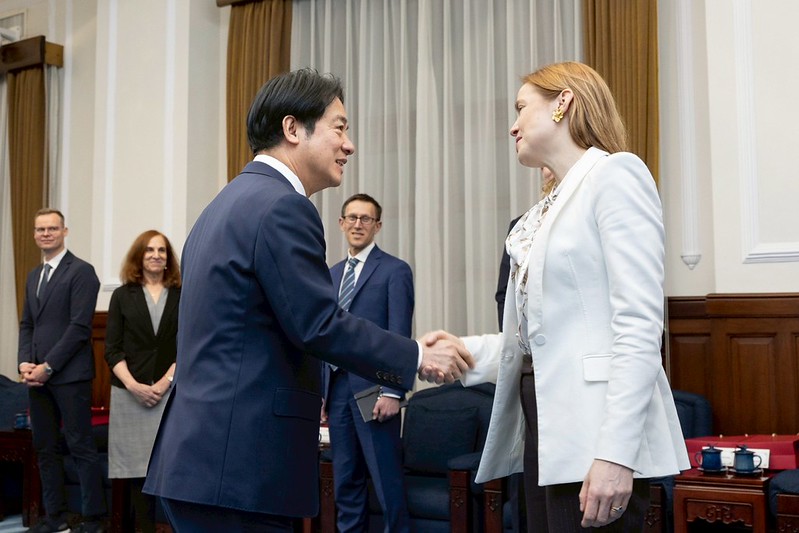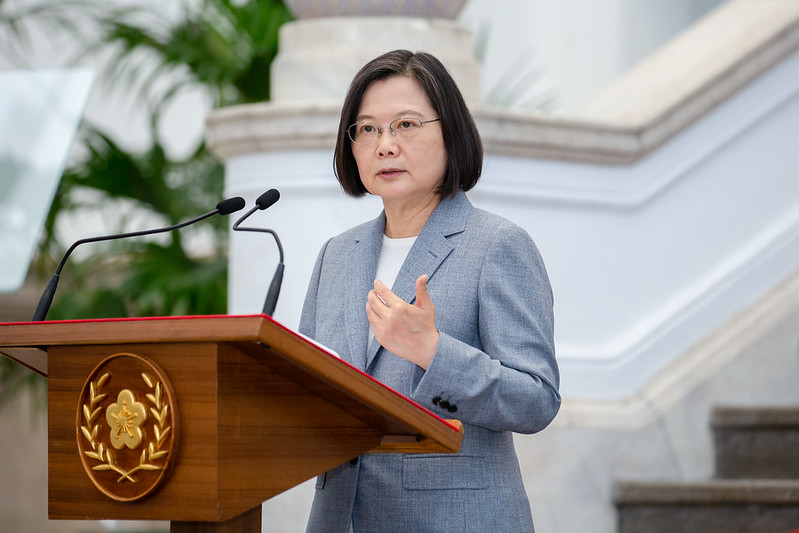News & activities
 News releases
News releases
President Tsai Ing-wen penned an article entitled "Taiwan and the Fight for Democracy—A Force for Good in the Changing International Order" at the invitation of Foreign Affairs magazine, which published the essay in its November/December 2021 issue. In the article, President Tsai shares the Taiwan Model, which is built on our embrace of democracy, emphasizing that despite difficult global circumstances, Taiwan has never shied away from challenges, and stands ready to be a global force for good, with a role on the international stage commensurate with our abilities.
Foreign Affairs, a bimonthly magazine published by the Council on Foreign Relations, is one of the most influential periodicals on international affairs and foreign policy in the United States. It is also well-known as a premier international forum for addressing key global issues through theory, analysis, and argument. Its readers include many US officials and opinion leaders, making Foreign Affairs a must-read in US policy circles and an important source of information for people involved in international relations around the globe, with a far-reaching impact.
The following is President Tsai's article:
Taiwan and the Fight for Democracy: A Force for Good in the Changing International Order
The story of Taiwan is one of resilience—of a country upholding democratic, progressive values while facing a constant challenge to its existence. Our success is a testament to what a determined practitioner of democracy, characterized by good governance and transparency, can achieve.
Yet the story of Taiwan is not only about the maintenance of our own democratic way of life. It is also about the strength and sense of responsibility Taiwan brings to efforts to safeguard the stability of the region and the world. Through hard work and courage, the 23.5 million people of Taiwan have succeeded in making a place for themselves in the international community.
Emerging from the COVID-19 pandemic, authoritarian regimes are more convinced than ever that their model of governance is better adapted than democracy to the requirements of the twenty-first century. This has fueled a contest of ideologies, and Taiwan lies at the intersection of contending systems. Vibrantly democratic and "Western," yet influenced by a "Chinese" civilization and shaped by Asian traditions, Taiwan, by virtue of both its very existence and its continued prosperity, represents at once an affront to the narrative and an impediment to the regional ambitions of the Chinese Communist Party.
Taiwan's refusal to give up, its persistent embrace of democracy, and its commitment to act as a responsible stakeholder (even when its exclusion from international institutions has made that difficult) are now spurring the rest of the world to reassess its value as a liberal democracy on the frontlines of a new clash of ideologies. As countries increasingly recognize the threat that the Chinese Communist Party poses, they should understand the value of working with Taiwan. And they should remember that if Taiwan were to fall, the consequences would be catastrophic for regional peace and the democratic alliance system. It would signal that in today's global contest of values, authoritarianism has the upper hand over democracy.
INDO-PACIFIC FUTURES
The course of the Indo-Pacific, the world's fastest-growing region, will in many ways shape the course of the twenty-first century. Its emergence offers myriad opportunities (in everything from trade and manufacturing to research and education) but also brings new tensions and systemic contradictions that, if not handled wisely, could have devastating effects on international security and the global economy. Chief among the drivers of these tensions is the rise of more assertive and self-assured authoritarianism, which is challenging the liberal democratic order that has defined international relations since the end of World War II.
Beijing has never abandoned its ambitions toward Taiwan. But after years of double-digit investment in the Chinese military, and expansionist behavior across the Taiwan Strait and in surrounding maritime areas, Beijing is replacing its commitment to a peaceful resolution with an increasingly aggressive posture. Since 2020, People's Liberation Army aircraft and vessels have markedly increased their activity in the Taiwan Strait, with almost daily intrusions into Taiwan's southern air defense identification zone, as well as occasional crossings of the tacit median line between the island and the Chinese mainland (which runs along the middle of the strait, from the north- east near Japan's outlying islands to the southwest near Hong Kong).
Despite these worrying developments, the people of Taiwan have made clear to the entire world that democracy is nonnegotiable. Amid almost daily intrusions by the People's Liberation Army, our position on cross-strait relations remains constant: Taiwan will not bend to pressure, but nor will it turn adventurist, even when it accumulates support from the international community. In other words, the maintenance of regional security will remain a significant part of Taiwan's overall government policy. Yet we will also continue to express our openness to dialogue with Beijing, as the current administration has repeatedly done since 2016, as long as this dialogue proceeds in a spirit of equality and without political preconditions. And we are investing significant resources to deepen our understanding of the administration in Beijing—which will reduce the risks of misinterpretation and misjudgment and facilitate more precise decision-making on our cross-strait policies. We look to maintain a clear-eyed understanding of the external environment, both threats and opportunities, in order to ensure that Taiwan is prepared to meet its challenges.
At the same time, Taiwan is fully committed to working with other regional actors to ensure stability. In March, for example, Taiwan and the United States signed a memorandum of understanding on the establishment of a coast guard working group. This working group will improve communication and information sharing between the U.S. and Taiwanese coast guards, while also facilitating greater collaboration on shared objectives, such as preserving maritime resources and reducing illegal, unreported, and unregulated fishing. Such an understanding should serve as a springboard for greater collaboration on nonmilitary matters with other partners in the Indo-Pacific.
Taiwan has also launched a series of initiatives to modernize and reorganize its military, in order to be better prepared for both present and future challenges. In addition to investments in traditional platforms such as combat aircraft, Taiwan has made hefty investments in asymmetric capabilities, including mobile land-based anti-ship cruise missiles. We will launch the All-out Defense Mobilization Agency in 2022, a military reform intended to ensure that a well-trained and well-equipped reserve force stands as a more reliable backup for the regular military forces. Such initiatives are meant to maximize Taiwan's self-reliance and preparedness and to signal that we are willing to bear our share of the burden and don't take our security partners' support for granted.
Taiwan's efforts to contribute to regional security do not end there. We are fully committed to collaborating with our neighbors to prevent armed conflict in the East China and South China Seas, as well as in the Taiwan Strait. Taiwan lies along the first island chain, running from Northern Japan to Borneo; should this line be broken by force, the consequences would disrupt international trade and destabilize the entire western Pacific. In other words, a failure to defend Taiwan would not only be catastrophic for the Taiwanese; it would overturn a security architecture that has allowed for peace and extraordinary economic development in the region for seven decades.
Taiwan does not seek military confrontation. It hopes for peaceful, stable, predictable, and mutually beneficial coexistence with its neighbors. But if its democracy and way of life are threatened, Taiwan will do whatever it takes to defend itself.
THE TAIWAN MODEL
Taiwan's history is filled with both hardship and accomplishments, and the authors of this history are the people of Taiwan. Over the past few decades, we have overcome adversity and international isolation to achieve one of modern political history's most successful democratic transitions. The key ingredients of this achievement have been patience, resourcefulness, pragmatism, and a stubborn refusal to give up. Understanding both the delicate balance of power in the region and the need for support, the Taiwanese know that practical collaboration is often better than being loud or adventurous and that a willingness to lend a hand is better than trying to provoke or impose a system on others.
While the people of Taiwan have not always achieved consensus, over time, a collective identity has emerged. Through our interactions with the rest of the world, we have absorbed values that we have made our own, merging them with local traditions to create a liberal, progressive order and a new sense of what it means to be Taiwanese.
At the heart of this identity is our embrace of democracy, reflecting a choice that the Taiwanese made and fought for after decades of authoritarian rule. Once the Taiwanese had made that choice there was no looking back. Imperfect though it may be, democracy has become a nonnegotiable part of who we are. This determination gives Taiwan the resilience to meet the challenges of the twenty-first century and provides a firewall against forces, both internal and external, seeking to undermine its hard-won democratic institutions.
A fundamental part of this embrace of democracy is a firm belief that the future of Taiwan is to be decided by the Taiwanese through democratic means. Although Taiwanese in some ways differ in their sense of what exactly this future should look like, we are united in our commitment to democracy and the values and institutions that allow us to fight back against external efforts to erode our identity and alter the way of life we cherish. The great majority of us regard democracy as the best form of government for Taiwan and are willing to do what is necessary to defend it. Those beliefs are tested every day, but there is no doubt that the people would rise up should the very existence of Taiwan be under threat.
Civil society has always played a major role in Taiwan. During the period of authoritarian rule under the Kuomintang, the Dangwai movement pushed to lift martial law and democratize Taiwan; even after being instrumental in ending martial law, it continued to offer an active and effective check on government power. Today, the extent of Taiwanese civil society's function in governance is unmatched anywhere in the region—a reflection of the trust between elected officials and citizens, who as a result are able to influence policy both through and between elections.
Taiwan's civil society has also proved integral to the island's international standing. Taiwan's exclusion from the United Nations and most other international institutions could have led to isolation, but Taiwan instead tapped into the tremendous creativity and capacity of its people, allowing us to establish global connections by other means—through small businesses, nongovernmental organizations, and various semi-official groupings. Rather than being an impediment, the refusal of many countries to officially recognize Taiwan compelled us to think asymmetrically, combating efforts to negate Taiwan's existence by deepening our engagement with the world through nontraditional channels.
In short, despite decades of isolation, the people of Taiwan have succeeded in making a place for themselves within the international community—and transforming Taiwan itself into an economic powerhouse and one of the most vibrant democracies in the Indo-Pacific.
CHANGING THE RULES
Taiwan's ability to survive and even thrive as a liberal democracy despite the extraordinary challenges to its existence has important implications for the prevailing rules of international relations. Our bid to play a more meaningful role in the international community is evolving in the context of changing regional politics, with more assertive act intended to challenge the liberal international order, backed by the economic and political power to turn those ambitions into action. With increasing awareness of the potential impact of such authoritarian ambitions, more and more countries have been willing to reexamine their long-standing assumptions about, and self-imposed limitations on, engagement with Taiwan.
Through its evolution as an economic powerhouse and a participatory democracy, Taiwan seeks to be—and in many ways already is—part of the solution to emerging challenges with ramifications on a planetary scale, from climate change and new diseases, to proliferation and terrorism, to human trafficking and threats to supply chains. The COVID-19 pandemic has shown that the world is now so interconnected that the outbreak of a disease in one corner of the planet can, within a matter of months, reach pandemic proportions. In many cases, the speed with which new emergencies arise and spread is beyond the ability of states and existing international institutions to respond. To prepare for future emergencies, the international community must move toward inclusiveness rather than rigidly adhering to current structures.
Even as it experienced a flare-up in COVID-19 cases last spring, Taiwan has demonstrated to the world that democratic systems can respond effectively to a pandemic, harnessing the powers of artificial intelligence, big data, and surveillance networks while ensuring that the information gathered is used responsibly. The pandemic has also given Taiwan an opportunity to share its experience with the world and to provide much-needed medical assistance to struggling countries. This is so, despite its long exclusion from global institutions such as the World Health Organization, which has left Taiwan little choice but to develop its own methods of cooperating and communicating with international partners. Being left out of the United Nations and other multilateral institutions has encouraged resilience and spurred novel approaches to dealing with challenges and crises of all kinds.
Despite being kept out in the cold, Taiwan has strived to adhere to international protocols, such as the UN Framework Convention on Climate Change, amending its domestic laws and seeking its own formulas for meeting increasingly complex challenges. Taiwan is also working proactively with its partners on the development of its region. In 2016, we launched the New Southbound Policy, which facilitates regional prosperity through trade and investment partnerships, educational and people-to-people exchanges, and technological and medical cooperation with countries in South and Southeast Asia, as well as Australia and New Zealand. Taiwan is also making investments in these partners through its business community, simultaneously fostering secure supply chains and regional development.
Indeed, with its high-tech leadership and educated and globalized workforce, Taiwan is well positioned to help create secure global supply chains in sectors such as semiconductors, biotechnology, and renewable energy—all areas where international cooperation is needed now more than ever. Our semiconductor industry is especially significant: a "silicon shield" that allows Taiwan to protect itself and others from aggressive attempts by authoritarian regimes to disrupt global supply chains. We are working to further strengthen our role in securing global supply chains with a new regional "high-end production hub" initiatives, which will solidify our position in the global supply chain. Besides making computer chips, Taiwan is active in high-precision manufacturing, artificial intelligence, 5G applications, renewable energy, biotechnology, and more, helping create more diverse and global supply chains that can withstand disruption, human or otherwise.
Taiwan derives additional soft power from expertise and capabilities in a variety of other fields, including education, public health, and natural-disaster prevention. And these are fields in which our experts and institutions are taking on a growing regional role. Our universities, for example, are prepared to work with other universities in the region to develop Chinese-language training. Our medical facilities are sharing expertise in medical technology and management with partners around Asia. And we are ready to work with major countries to provide infrastructure investment in developing countries, leveraging efficiency while promoting good governance, transparency, and environmental protection. Similar efforts are being made through an agreement with the United States to enhance cooperation on infrastructure financing, investment, and market development in Latin America and Southeast Asia. In short, Taiwan can be a crucial force in the peaceful development and prosperity of our region and the world.
DEMOCRATIC VALUES
Sitting on the frontlines of the global contest between the liberal democratic order and the authoritarian alternative, Taiwan also has an important part to play in strengthening global democracy. In 2003, we established the region's first nongovernmental organization devoted to democracy assistance and advocacy, the Taiwan Foundation for Democracy. Following the models set by the United States' National Endowment for Democracy and the United Kingdom's Westminster Foundation for Democracy, the TFD provides funding for other non- governmental organizations, international and domestic, that advocate democratic development and human rights. It also works to promote public participation in governance through mechanisms such as participatory budgeting and to encourage youth engagement through initiatives such as the annual Asia Young Leaders for Democracy program. In 2019, the TFD organized its inaugural regional forum on religious freedom, and my government appointed its first ambassador-at-large for religious freedom.
Taiwan's strong record on democracy, gender equality, and press and religious freedom has also made it a home for a growing number of global nongovernmental organizations, which have faced an increasingly difficult environment in Asia. Organizations including Reporters Without Borders, the National Democratic Institute, the International Republican Institute, the European Values Center for Security Policy, and the Friedrich Naumann Foundation for Freedom have set up regional offices in Taiwan. From Taiwan, they are able to continue their important work in the region without the constant threats of surveillance, harassment, and interruptions by authorities. We have also made ourselves hospitable to international institutions interested in establishing a presence in the Indo-Pacific, helping turn Taiwan into a hub for advancing the interests of the democratic community.
Meanwhile, the Global Cooperation and Training Framework—a platform jointly administered by Taiwan, the United States, and other partners that allows us to share our expertise with countries around the world—has fostered creative cooperation on issues such as law enforcement, public health, and good governance. One recent round of GCTF activity, for example, focused on media literacy and how democracies can combat disinformation—an area in which Taiwan has an abundance of experience.
Over the past five years, more than 2,300 experts and officials from more than 87 countries have attended GCTF workshops in Taiwan, and the forum will continue to expand—offering a path to greater collaboration between Taiwan and countries around the world, including the United States. Indeed, Taiwan works closely with the United States on many issues, in the service of regional peace and stability. Our hope is to shoulder more responsibility by being a close political and economic partner of the United States and other like-minded countries.
A FORCE FOR GOOD
The threat posed by authoritarian regimes has served as an important wake-up call for democracies, spurring them to emerge from their complacency. Although extraordinary challenges remain, democracies around the world are now working to safeguard their values and renew their ossified institutions. Alliances are being rekindled to serve the interests of the international community.
Taiwan may be small in terms of territory, but it has proved that it can have a large global presence—and that this presence matters to the world. It has persevered in the face of existential threats and made itself an indispensable actor in the Indo-Pacific. And through it all, the Taiwanese commitment to democracy has never been stronger: the people of Taiwan know that democracy is the lasting path and the only game in town.
Over the past two years, our handling of the COVID-19 pandemic, and our assistance to and collaboration with countries around the world, has offered one more example of the crucial role that Taiwan can play and of why Taiwan matters. Going forward, our high-tech industries, and especially our production of advanced semiconductors, will continue to fuel the global economy. And, Taiwan's ability to balance ties to various countries while defending its democratic way of life will continue to inspire others in the region.
We have never shied away from challenges. Although the world faces an arduous journey ahead, this presents Taiwan with opportunities not seen before. It should increasingly be regarded as part of the solution, particularly as democratic countries seek to find the right balance between the need to engage and trade with authoritarian countries and the need to defend the values and democratic ideals that define their societies. Long left out in the cold, Taiwan is ready to be a global force for good, with a role on the international stage that is commensurate with its abilities.
Tsai Ing-wen is the President of the Republic of China (Taiwan).








